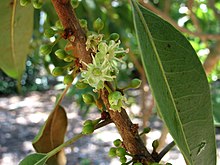Sideroxylon polynesicum
Appearance
| Sideroxylon polynesicum | |
|---|---|

| |
| Scientific classification | |
| Kingdom: | Plantae |
| Clade: | Tracheophytes |
| Clade: | Angiosperms |
| Clade: | Eudicots |
| Clade: | Asterids |
| Order: | Ericales |
| Family: | Sapotaceae |
| Genus: | Sideroxylon |
| Species: | S. polynesicum
|
| Binomial name | |
| Sideroxylon polynesicum (Hillebr.) Smedmark & Anderb.
| |
| Synonyms | |

Sideroxylon polynesicum, the keahi or island nesoluma, is a species of flowering plant in the family Sapotaceae. It is found in the Cook (New Zealand), Tubuai (French Polynesia), and Hawaiian Islands (United States).[1] It is threatened by habitat loss.[1]
Taxonomy
[edit]This species was first described as Chrysophyllum polynesicum by William Hillebrand in 1888, two years after his demise.[3] Then Henri Ernest Baillon transferred it to the genus Nesoluma, all of whose constituent species were later incorporated into the genus Sideroxylon as a result of phylogenetic analyses.[4]
References
[edit]- ^ a b c World Conservation Monitoring Centre (1998). "Nesoluma polynesicum". IUCN Red List of Threatened Species. 1998: e.T32010A9673343. doi:10.2305/IUCN.UK.1998.RLTS.T32010A9673343.en. Retrieved 15 November 2021.
- ^ Govaerts, R. et al. (2021). World Checklist of Sapotaceae. Facilitated by the Royal Botanic Gardens, Kew. Published on the Internet; https://wcsp.science.kew.org/namedetail.do?name_id=348468 Retrieved 26 October 2021
- ^ Hillebrand, W. (†) (1888). Flora of the Hawaiian Islands: a description of their phanerogams and vascular cryptogams. London: Williams & Norgate; New York: B. Westermann & Co.; Heidelberg: Carl Winter. p. 277.
- ^ Smedmark, J.E.E.; Anderberg, A.A. [in Swedish] (2007). "Boreotropical migration explains hybridization between geographically distant lineages in the pantropical clade Sideroxyleae (Sapotaceae)". American Journal of Botany. 94 (9): 1502. doi:10.3732/ajb.94.9.1491.

